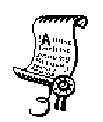
One of the most rewarding experiences for a teacher is to see the students achieve the main goal of their pursuits - knowledge. Still, the teacher's role in living through this experience is limited. The responsibility for gaining knowledge in the academic environment rests in a large part on the student. The role of a teacher in the students' pursuit of knowledge is merely supporting and guiding. I am determined to give you the best of myself, but the effective amount of support that each of you will get from me depends directly on your own investment. Your effort is the main factor in your success: if you do not care about learning, your time spent in this class will be wasted (my time spent with you will be wasted as well). We are all sharing the responsibility for making this course work and making it truly a learning experience.

In my experience, both as a student and as a teacher, class attendance is one of the strongest catalysts for success in learning. Students who skip classes are seldom successful. Coming to class stimulates timely reading of the material and helps you to be up to date on what is happening in the course. Our in-class discussions and exercises will be an important factor in your learning. Understanding something on your own will often cost you a multiple of what it takes in class. Class attendance is mandatory for this course. If you feel that this constitutes exceptional hardship on you, please see me and we will work something out on a case by case basis (you do need to talk to me if you anticipate skipping classes).
Please, write down the questions that arise in your mind during your reading, working on your assignments, or working on your project. You will have an opportunity to raise these questions during the class meetings. Your questions are the best form of feedback that you can provide me with and guide me in adjusting the profile of our meetings to your needs. I will periodically prompt you for questions, but please feel free to interrupt me at any time with questions that require immediate attention.

You will be expected to read portions of the textbook before each class meeting. Reading assignments are listed in the course outline. Performing these assignments is crucial for our class meetings. If you let your reading slide, you will soon find yourself hopelessly behind. The time spent before each class usually pays off generously - you will learn much more from the class meeting and will spend much less time doing your programming assignment.
I will feel free to call on you whether or not you raise your hand on the assumption that you have come to class prepared. I reserve the right to administer surprise quizzes testing students' familiarity with the readings and will exercise this option if I feel that students are not prepared for the class. These quizzes will increase the total points on which the course grade will be calculated, and grading will be adjusted accordingly.

Your in class activity is crucial in making this course successful. I will be rewarding your activity with up to additional 10% of your score when determining your final grade for the course. This is especially helpful in lifting your grade in case your score falls between two grades. By activity I mean participating in class discussions, asking relevant questions, volunteering to provide answers to instructor's questions, volunteering to solve problems at the blackboard if prompted, and providing creative suggestions that improve the course.

It is often the case that students view each other as competitors for good grades. I strongly believe that there is no reason for viewing one another as competitors. Your classmates of now will be your colleagues of the future. Friendships that you build in college will often last throughout your professional career. Students enrolled in this class should feel members of a team that is working towards the same goal and collaborate rather than compete. Unless explicitly forbidden, it is allowed and advised to discuss the material and programming assignments with each other. In fact, most of the assignments will involve group work. Do as much as you can alone to develop independent thinking but do not hesitate to ask questions of your colleagues. Never refuse to help your classmates. I will not manipulate your grades artificially (e.g., curve-fit the grades so that a certain percentage of you get As and a certain percentage of you fail) and if all of you learn a lot, all of you can end up with excellent grades. The performance of your colleagues will be synergistic with your performance - by doing well they will help us all to create a learning experience and indirectly help the whole class to do better.

The University of Pittsburgh's policy on academic integrity states that "A student has an obligation to exhibit honesty and ethical conduct in carrying out his or her academic assignment." Now and then there are students who do not accept this view. This is not too wise, as it undermines and handicaps their future no matter how successful they may be in the short run. There is a thin boundary between collaboration, allowed and stimulated in this class, and plagiarism, which is unethical and forbidden by the university. Remember that whenever you turn your work in you are signing it with your name. This certifies that you are the primary author of the submitted work (group assignments will be signed by all members of the group) and I assume that it is expression of your original ideas. Even if you have discussed your work with others, you should not have copied it from others or let others copy your work. Violations of this policy go against the spirit of academia and, if discovered, will be treated with the severity that they deserve.

I would like to encourage you to come to see me or the GSA if you are having difficulties with the class. We will try to make time to meet with you individually, but we would like to ask for some courtesy on your part. Teaching this course is just one of our many responsibilities. Interruptions, especially those that come when we are working on completely unrelated subjects, are very costly to us. To protect us from such interruptions, we have scheduled office hours. Office hours are distributed over most of the days of the week, and with some planning on your part you should not need to visit us outside the designated times. I would like to request you to respect these hours. If coming to the office hours is a problem, please get in touch with me to schedule a more suitable time.

My experience has shown that students like to know how well they are doing and how their performance compares to the performance of their classmates. Unfortunately, privacy considerations do not allow me to show you the grades of your colleagues. I am going to apply a solution that worked well in the past, which is allowing each student to choose a unique identifier that will subsequently appear instead of the student's name on progress reports. This gives you the opportunity to identify yourself on the list and compare your performance to that of the rest of the class while preserving your anonymity. This is completely voluntary - you may choose not to participate by indicating this during the first class meeting. In this case, your scores will not appear on the lists, but to be fair towards the rest of the class you will not receive copies of the lists yourself.

It is somewhat embarrassing to talk about this issue, but since haggling does happen, I would like to outline my view in order to avoid possible surprises. Increasing your grade because "you need it" is out of question. As far as your work is concerned, I promise to grade it thoroughly and fairly. If you believe that I have made a mistake in grading your work, please see me and I will be glad to look at it again. In fairness to the rest of the class and to me, I will sit down at the negotiation table with you under one condition that you will have to accept a-priori: if you come with a complaint about my grading in one part of your assignment, I will review the entire assignment again regardless of whether this will lead to an increase or decrease of your score (the latter may happen if my review indicates flaws in your work that I had not noticed before). This makes us equal partners in the negotiation, as it changes your position from "no-lose" to what I believe to be a more reasonable one (note that haggling about the grades is generally unfair as few students point out errors on the part of the grader that benefited their grade).

If you have a disability that requires special testing accommodations or other classroom modifications, you need to notify both the instructor and the Office of Disabled Student Services no later than the 4th week of the term. You may be asked to provide documentation of your disability to determine the appropriateness of accommodations. To notify DSS, call 648-7890 (Voice or TDD) to schedule an appointment. The office is located in 216 William Pitt Union.
INFSCI 1022 main page
Marek Druzdzel's teaching page
Marek Druzdzel's home page